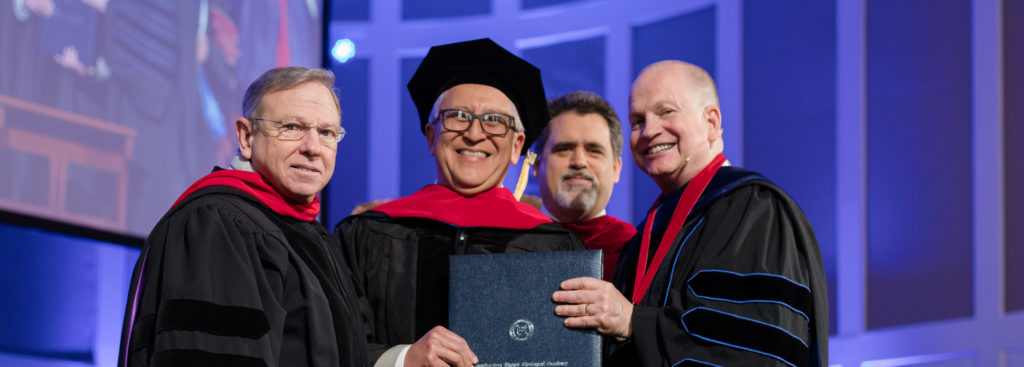Graduation Spotlight: How D.Min. graduate Ramon Osorio is equipping Hispanic church planters to fulfill the Great Commission
Lauren Pratt | December 16, 2019

Ramón Osorio is no stranger to the world of church planting.
After serving as a pastor and church planter for two decades, Osorio now serves as the national church mobilizer for the North American Mission Board’s (NAMB) Hispanic church plants. It’s a responsibility he does not take lightly. His experience has taught him that churches form as a result of disciples being made.
That is why planting churches and mentoring young pastors is at the heart of Osorio’s ministry.
“The Great Commission is to make disciples, and as you make disciples, churches will start,” said Osorio. “In ministry, I really hope that churches will catch the vision of making disciples of all nations and in the process that they would reach more people.”
Osorio, who now lives in the Atlanta area near NAMB’s Alpharetta headquarters, grew up in Tegucigalpa, Honduras. He remembers what it was like to be religious without a true relationship with God. Osorio’s family was Roman Catholic, and he went to a Christian high school where he learned more about who God was. Despite all of this, it was not until after college that he surrendered his life to Christ.
With bachelor’s degrees in management, international business and economics, Osorio was more than ready to pursue life in the business world.
This was the life Osorio was building until 1999. That year, God totally changed the direction of his life.
“In the midst of [building my career], I knew that the Lord was calling me to serve him in ministry,” Osorio said.
He remembers packing up his belongings and moving nearly 3,000 miles with his wife and two daughters from Tegucigalpa, Honduras to Louisville, Kentucky to plant in 2000. Over the course of 13 years, Osorio planted Amistad y Vida Hispanic Church and Highview Baptist Church Campus La Respuesta in Louisville.
 In 2013, Osorio joined the team at NAMB. He knew how to connect with bivocational church planters, but felt that he lacked the training he needed to work strategically among the 3,500 Hispanic church plants that exist within the Southern Baptist Convention. This is what prompted him to pursue his Doctor of Ministry at Southeastern Baptist Theological Seminary (SEBTS). As a self-described “get it done kind of guy,” the D.Min. program at SEBTS was exactly the kind of training on which this church planting strategist thrived.
In 2013, Osorio joined the team at NAMB. He knew how to connect with bivocational church planters, but felt that he lacked the training he needed to work strategically among the 3,500 Hispanic church plants that exist within the Southern Baptist Convention. This is what prompted him to pursue his Doctor of Ministry at Southeastern Baptist Theological Seminary (SEBTS). As a self-described “get it done kind of guy,” the D.Min. program at SEBTS was exactly the kind of training on which this church planting strategist thrived.
“I loved the fact that it was a really good combination between theory and practicality,” said Osorio.
Now Osorio is using his training to train other pastors to think strategically about their church plants. One of the greatest struggles Hispanic church planters have, he said, is thinking through the processes of making disciples and developing leaders within the local church. Part of the difficulty is due to how many planters serving bivocationally, creating less time for ministry responsibilities. This is where Osorio’s strategic training is helping pastors best use their time for ministry.
Osorio hopes that with the right training more pastors can learn what it looks like to lead multiplying churches, as he wrote about in his dissertation, “A Strategic Plan to Help Select Southern Baptist Hispanic Churches Become Multiplying Churches.”
Mike Dodson, Osorio’s major professor and assistant professor of church planting and evangelism, saw tremendous growth throughout Osorio’s time in the D.Min. program.
“Going through the D.Min. program has transformed the way Ramón strategically approaches his ministry at NAMB, as he works to multiply the hope of the gospel among ethnic churches and peoples across North America,” said Dodson, who also serves as associate director of North American missions of the Center for Great Commission Studies at SEBTS and multiplication pipeline specialist for NAMB. “It’s been a great joy and privilege to get to know him. He’s been a tremendous blessing to me as well as the other students in his cohort.”
Osorio will be the first to tell you that pursing an advanced degree is not about the accolades; it’s about being better equipped to fulfill the Great Commission no matter the location.
“In ministry, somebody who is going for a doctorate degree has two reasons: (1) the love of learning and (2) the ability to fulfill their ministry with better tools,” he said.
Charles Harvey, director of Doctor of Ministry programs at SEBTS, has witnessed this firsthand in Osorio’s time at Southeastern.
“Dr. Osorio did a great job in the Doctor of Ministry program, excelling in the classroom and research,” said Harvey. “He contributed greatly in the classroom with his experience, insights, and comradery and demonstrated an infectious and uplifting spirit among the students and faculty. Ramon represents the kind of D.Min. graduate we want representing our program and school. We hope his association with our program will continue in the D.Min. work with Spanish speaking ministers.”
SEBTS now has 11 specialized D.Min. programs, ranging from expository preaching to biblical counseling. To learn more about these and other degree programs at SEBTS, visit sebts.edu/academics.